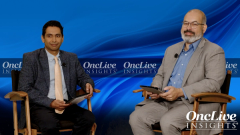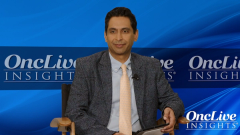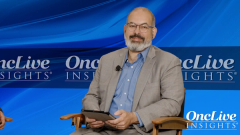
Takeaways and Considerations for the Future in the Treatment of SCLC
Jorge Nieva, MD, and Ashish Saxena, MD, PhD, discuss the possibility of expanding the use of supportive care regimens to reduce the effects of myelosuppression in patients with SCLC.
Episodes in this series

Transcript:
Ashish Saxena, MD, PhD: As the role of supportive care and small cell lung cancer treatment, expands, what are your practical takeaways that you have and things you'd like to see emphasized in future and continued analyses of chemotherapy induced myelosuppression?
Jorge Nieva, MD: In the future, we certainly want to see more studies that use different regimens in combination with trilaciclib. Currently, we're really only using it in patients with extensive-stage small cell lung cancer, with a carboplatin etoposide backbone. In the future, we should see more studies, more research done on expanding this to other regimens because myelosuppression is not a problem exclusively in this particular regimen and this particular patient population. We want to see all of our patients have the benefit of as little myelosuppression as possible so long as we know that supportive care intervention doesn't affect outcomes negatively. We have so far a pretty good track record in our first indication with this medication. Hopefully, we'll start to see more expansion.
Ashish Saxena, MD, PhD: Absolutely. Thank you, Dr. Nieva, for this discussion. Before we conclude, I would like to get your closing thoughts on unmet needs and future perspectives on the treatment of patients with small cell lung cancer.
Jorge Nieva, MD: [Patients with] small cell lung cancer, unfortunately, a large percentage of them don't get cured with the original regimen. We really need to start looking at second-, third-line regimens that improve outcomes, and making second- and third-line regimens as tolerable for patients as much as possible.
Ashish Saxena, MD, PhD: The major advances we've had more lately have been with the addition of immunotherapy but that also, as you said, doesn't always affect or help a lot of patients as much as we'd like to, so looking at new strategies to sort of enhance the durability of treatment for extensive stage small cell lung cancer patients, and also making it more tolerable are really important and possibly doing some more targeted therapies as we've seen, some indications that we may be able to do at this ASCO [American Society of Clinical Oncology] would be really important. Thank you again, to our viewing audience, we hope you found this OncLive® Insightsdiscussion to be useful and valuable to the treatment of your patients with small cell lung cancer.
Transcript edited for clarity.






































